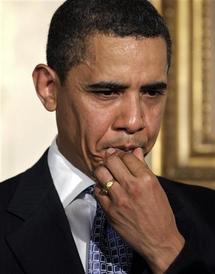
The president and his wife Michelle, a descendant of African slaves, stepped down from the plane holding their daughters' hands.
Thousands of excited Ghanaians ringed the route hoping to witness the start of a landmark visit.
During the 24-hour visit, Obama was expected to push his vision on good governance and economic development for Africa, hours after securing a 20 billion dollar fund to feed the world's hungry during a G8 summit in Italy.
From as early as 8:00 am (0800 GMT), police had blocked off some of the major roads in Accra, including the route to the airport, for ordinary motorists.
On Saturday Obama and his wife were due to tour Cape Coast Castle, one of Africa's biggest former slave trading posts.
Authorities in Cape Coast, a town some 160 kilometres (100 miles) west of Accra, banned all funerals this weekend for the visit.
Ghana's central regional minister Ama Benyiwaa Doe told AFP: "The dead can be buried later, but Obama is here for once and we must pay all attention to him."
Bookshops in Accra, meanwhile, were stocked with piles of Obama's "The Audacity of Hope" book. And larger-than-life posters of Obama and Atta-Mills with the slogan "partnership for change" and "akwaaba" (native for welcome) were omnipresent.
Obama picked Ghana for his maiden visit to the region as it is one of the few success stories on the continent in terms of democracy and prosperity.
He described it as a functioning democracy with peaceful and successful elections in the past 10 years.
Obama will be the third consecutive US leader to travel to Ghana in under a decade. Historically, Ghana was also the first black African country to break free from its colonial shackles in 1957.
Obama will address Ghana's parliament about democracy and development, but wants the latest of his series of key foreign policy speeches to be heard right across the African continent.
Atta-Mills took office in January after one of the closest votes the country has seen -- winning by less than one percent of the vote.
But the choice of Ghana has riled other countries in Africa and cast a spotlight on issues that some governments would sweep under the carpet.
Kenya's leading daily The Nation said Obama had dealt a "public snub" with his decision to visit Ghana rather than the land of his forefathers.
Nigerians meanwhile were vexed that Obama was leaving out what they call the giant of Africa, with its population of 140 million people and its huge oil resources.
Formerly known as the Gold Coast, Ghana, a country of 23 million people, is best known for its cocoa and gold.
---------------------------------------------------------------------------------------------------------------------------
Thousands of excited Ghanaians ringed the route hoping to witness the start of a landmark visit.
During the 24-hour visit, Obama was expected to push his vision on good governance and economic development for Africa, hours after securing a 20 billion dollar fund to feed the world's hungry during a G8 summit in Italy.
From as early as 8:00 am (0800 GMT), police had blocked off some of the major roads in Accra, including the route to the airport, for ordinary motorists.
On Saturday Obama and his wife were due to tour Cape Coast Castle, one of Africa's biggest former slave trading posts.
Authorities in Cape Coast, a town some 160 kilometres (100 miles) west of Accra, banned all funerals this weekend for the visit.
Ghana's central regional minister Ama Benyiwaa Doe told AFP: "The dead can be buried later, but Obama is here for once and we must pay all attention to him."
Bookshops in Accra, meanwhile, were stocked with piles of Obama's "The Audacity of Hope" book. And larger-than-life posters of Obama and Atta-Mills with the slogan "partnership for change" and "akwaaba" (native for welcome) were omnipresent.
Obama picked Ghana for his maiden visit to the region as it is one of the few success stories on the continent in terms of democracy and prosperity.
He described it as a functioning democracy with peaceful and successful elections in the past 10 years.
Obama will be the third consecutive US leader to travel to Ghana in under a decade. Historically, Ghana was also the first black African country to break free from its colonial shackles in 1957.
Obama will address Ghana's parliament about democracy and development, but wants the latest of his series of key foreign policy speeches to be heard right across the African continent.
Atta-Mills took office in January after one of the closest votes the country has seen -- winning by less than one percent of the vote.
But the choice of Ghana has riled other countries in Africa and cast a spotlight on issues that some governments would sweep under the carpet.
Kenya's leading daily The Nation said Obama had dealt a "public snub" with his decision to visit Ghana rather than the land of his forefathers.
Nigerians meanwhile were vexed that Obama was leaving out what they call the giant of Africa, with its population of 140 million people and its huge oil resources.
Formerly known as the Gold Coast, Ghana, a country of 23 million people, is best known for its cocoa and gold.
---------------------------------------------------------------------------------------------------------------------------









 Home
Home Politics
Politics









